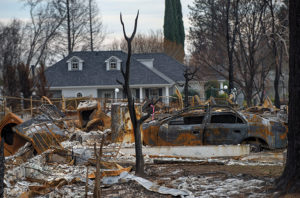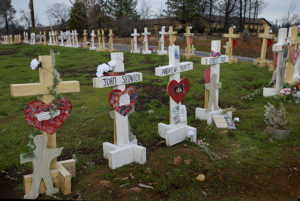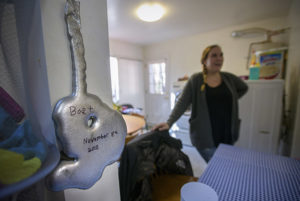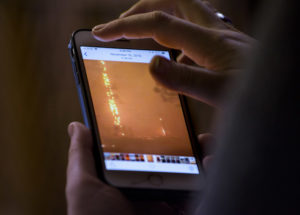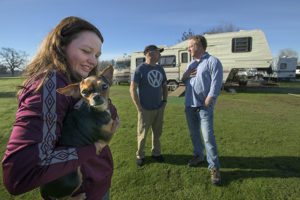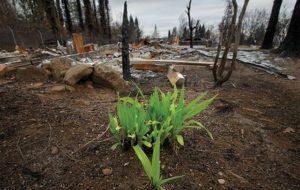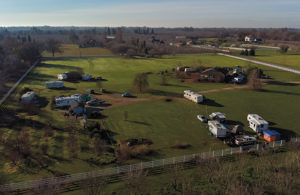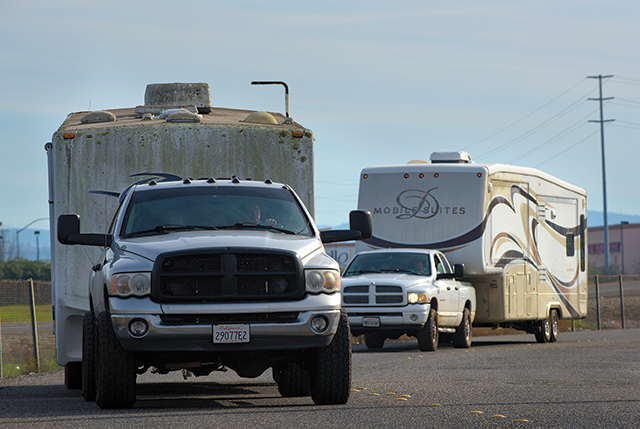
Two RVs on the road to Paradise, California.<br />
A new home is rolling into Chico, California.
Carl Limpus, a guy with a big heart and a big pickup, is delivering a 28-foot RV, circa 2009, from central California to Chico in northern California on a bright Saturday morning in late January. He stops by the side of the road long enough for James “Woody” Faircloth (’90) and Faircloth’s 6-year-old daughter, Luna, to climb aboard briefly to drop off new sheets, pillows and a comforter in the RV’s bedroom.
Back on the road, Limpus drives to the Butte County bus maintenance lot and parks the RV under an overhang, beside dozens of county buses. Faircloth and Luna, who’ve made the trip here from their home in Denver, Colorado, follow him in a rented Toyota.
A bus parking lot is hardly an idyllic setting for a home. But Rodney Davis, a soft-spoken, young-looking father of five, doesn’t seem to care. He’s eager to move his wife and three youngest children into the RV. They’ve been waiting for this day since Nov. 8 when the Camp Fire, the deadliest and most destructive wildfire in California history, destroyed their home and much of their town of Paradise. Davis was already at work here at the bus garage in nearby Chico that day as his wife frantically grabbed their children from school and raced down the mountain ahead of the flames.
“We’ve been through a lot,” he says with some understatement. “Our baby keeps asking, ‘Are the fires gone? Are we safe?’”
Davis was living in a hotel an hour away when a guy he had never met named Woody Faircloth called to offer him a free RV. An individual in Nipomo, California, 400 miles away, had donated it to Faircloth’s burgeoning quest to help the people of Paradise.
Outgoing and empathetic, Faircloth has a way of bonding with survivors, who open up to him about the worst day of their lives. “He has a heart for this,” Davis says of Faircloth. “I heard a lot of broken promises (from others). The more I talked to Woody, the more real it seemed. I saw it coming down the road, and it was such a relief. We’ll have some stability.”
Faircloth watches as Limpus and Chris Smith, another good-hearted guy with a pickup, set up the RV and give Davis a tour. Faircloth can’t stop talking about, of all things, how there’s a perfect spot for the RV because a particular overhang on a building hangs too low for tall buses to clear. Davis has permission from his boss to park — and live — in that spot.
The day a bus bumped and scraped that low overhang was probably a bad day for the driver. But on this day, Faircloth is marveling at how the bad event for the bus driver was a good event for the Davis family. The confluence of the two events might seem unrelated in some people’s minds but not to Faircloth’s way of thinking. He sees synchronicities everywhere and perfection in the just-in-time work of what he calls “angels,” helping him bring hope — one RV at a time — to a broken community.
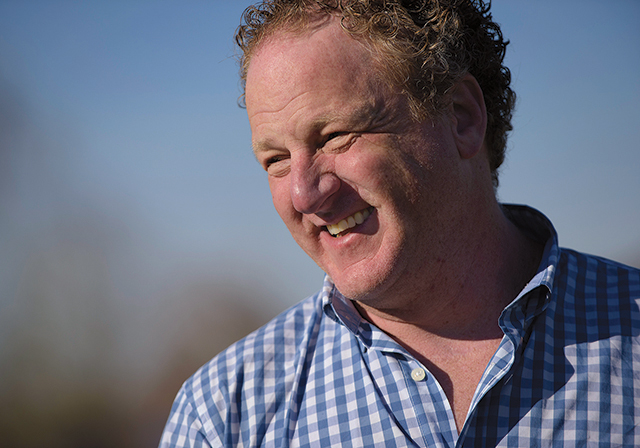
Faircloth, 50, is a big, burly, teddy bear of a guy who has seemingly never met a stranger. He watched on TV with the rest of the world as the Camp Fire — named for its place of origin on Camp Creek Road — engulfed the town of Paradise, 90 miles north of Sacramento. Residents had to flee the 15 miles down Skyway Road to Chico ahead of the raging wildfire. Most had only minutes to grab their children and pets and pray that they could get down the ridge before the flames engulfed them. More than 80 people, many of them elderly, didn’t make it, trapped in their homes or in their cars. By the time the fire was 100 percent contained 17 days later, it had destroyed 14,000 homes in Paradise and left most in the town of 27,000 people traumatized and homeless.
Faircloth felt sad for all those people who had lost their homes, but what could he — one man — do? When your neighbor’s house burns down, you know what to do. But when a whole town burns down, what can you do?
He was looking forward to a week off from his job as a national account manager for Comcast to spend Thanksgiving at home with Luna. But try as he might, he couldn’t look away from the newscasts that showed families, veterans, children with disabilities living in cars and tents in parking lots. He struggled: Should he try to help, or just send thoughts and prayers to the survivors and settle in for a big Thanksgiving dinner and some football?
#DoSomething. It was a hashtag he adopted that week and one that marks his stance today. “If you’re in a position to help, why wouldn’t you help?” he says simply. “It’s how I was raised. These people are our neighbors, and they need our help.”
 He scoured Craigslist to see what the survivors needed. Housing was No. 1 in an area with too few houses, apartments and hotel rooms even before the fire. Maybe, he thought, he could raise enough money to buy an RV to help one family.
He scoured Craigslist to see what the survivors needed. Housing was No. 1 in an area with too few houses, apartments and hotel rooms even before the fire. Maybe, he thought, he could raise enough money to buy an RV to help one family.
He set up a GoFundMe page and found a 1987 Ford Econoline RV for sale on Craigslist in a Denver suburb. When the RV owner learned what Faircloth was doing, he cut the price to $2,500, a third of the asking price. Faircloth hadn’t yet raised enough money, so he withdrew some from his own bank account. The RV owner wrote out the bill of sale on a napkin, and Faircloth and Luna hit the road for the 1,400-mile drive to Paradise.
“A Thanksgiving miracle is about to happen!” Faircloth posted on social media as they headed west, driving an RV for the first time in his life. Luna, his gap-toothed co-pilot, was all in, saying, “God and Santa Claus will be proud of us.”
Two days later, they arrived in Chico and gave the RV to a family of six who had been living in their car. As good as Faircloth felt to help one family, the devastation and survivors’ stories were overwhelming. It was too much to take in. He had done his good deed. Now, he couldn’t wait to get out of Paradise.
On the trip home, however, something unexpected happened. #DoSomething was spreading on social media. Faircloth’s phone was “blowing up.” Desperate survivors were pleading for help. Strangers were offering to donate their RVs. Friends from Wake Forest and Denver were asking how they could help. Something big was unfolding, out of his control. There was no stop button. “I tried hard to fight it and control what was happening,” Faircloth says. “I just had to let go. The letting go part was the scariest part. That first night I really felt like God was involved. I was like, ‘OK, I’m in. I’ll do this. Show me the way.’”
It turns out, he was just getting started. “I’m not the one driving the RV,” he says.
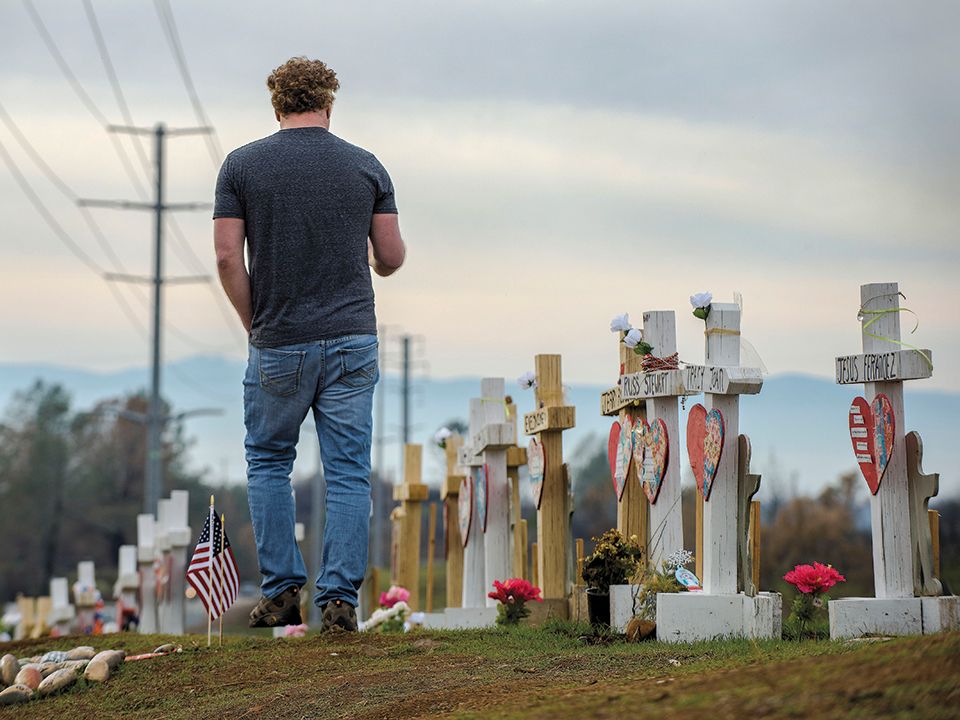
Woody Faircloth visits an impromptu memorial to the victims of the Camp Fire.
Faircloth admits that he doesn’t go to church as much as his mother would like. But, he says, he must have learned something from Sundays at Reynolda Presbyterian Church when he was growing up and the faith of his parents and grandparents.
He grew up in Winston-Salem, the middle son of Bill “Big Daddy” (’64) and Becky Faircloth; “Big Daddy” is a retired longtime assistant athletic director for football. His brothers, Scott (’89, MBA ’94, P ’19) and Barry (’93, P ’22), are also alumni; Barry Faircloth is senior associate athletic director for development at Wake Forest.
He didn’t give much thought to angels before Paradise. Now he says he sees angels in everything he does. Need someone to haul RVs to Chico? Limpus and Smith raise their hands. Between them, they’ve hauled a dozen RVs to Chico. Need a quiet place to park some RVs? A couple open their farm and hearts to survivors with nowhere else to go. Need some toys to give to Paradise children at Christmas? Luna’s classmates organize a toy drive. Need a truck to haul a donated RV from Colorado to California? A stranger tosses Faircloth his keys and says, “Take my truck.”
“Who does that?” Faircloth marvels. “That is not normal behavior.”
A Littleton, Colorado, attorney named Larry Zehfuss (’86) helped set up a nonprofit called RV4CampfireFamily. A friend in Denver, Anna Segur, and one in California, Julie Siegenthaler, help match donated RVs with survivors needing a place to live. (Most of the RVs have been donated; most of the $125,000 he’s raised is being used to repair RVs if needed.) California friends Natalie Feulner and Salma Zawawi help Faircloth spread the word through social media and to news organizations. Faircloth, with his communication major on display, has appeared on The Weather Channel and Steve Harvey’s afternoon talk show. “Woody operates fully and unapologetically from the heart,” Feulner says.
Faircloth has learned to follow his heart and his faith. If he had listened to his doubts, he would never have left the sofa. He figures now if something is meant to happen, it will. “Every time we hit a roadblock, it gets me excited,” he says. “When something bad happens, that’s OK, because it opens the door to something good happening.”
His faith is put to the test when Luna loses a GoPro camera in a Chico parking lot. “Yay, we lost the camera!” he says, mustering up as much excitement as he can. “Someone else must need a camera more than we do!”
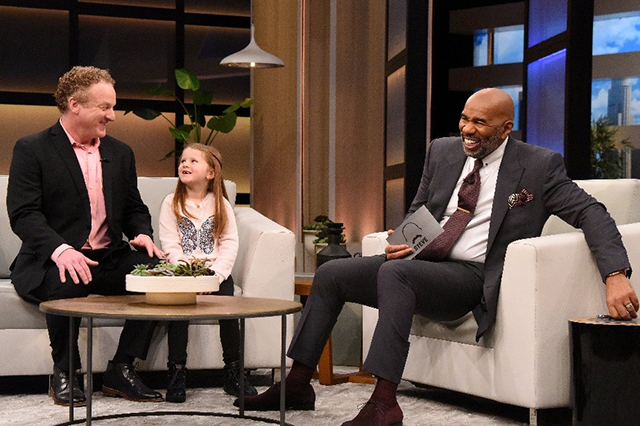
Faircloth and Luna appeared on the Steve Harvey Show earlier this year to talk about the RV4CampfireFamily nonprofit,
To understand how badly people in Paradise are suffering, you need to see the devastation and talk with some of the survivors, Faircloth tells me as he drives us from Chico to Paradise in January. He warns me to be prepared. “When you get here and get up close, it just really puts it into perspective in a way that you can’t get from television. You feel the loss here and just the total devastation. It’s just overwhelming.”
As we approach Paradise, he stops at an impromptu memorial on a hillside. Eighty-six handmade wooden crosses are arranged in an L-shape — one for each person who died in Paradise and the neighboring communities of Concow and Magalia. (The official death toll has since been lowered to 85.) Names and ages painted on the crosses, and on some, handwritten notes, give the bare outlines of lives lost. “Vernice Regan, age 95.” “Andrew Burt, age 36: We miss you Brother. Only the good die young.” “Victoria Taff, age 67: I luv u mom.” The normally talkative Faircloth doesn’t say much. “That was someone’s momma or grandma.”
In Paradise, signs for KFC, Burger King and McDonald’s still summon customers, but the restaurants are gone. On one corner, the Chevron gas station is gone; across the street, the Stop & Save survived. Faircloth turns down a side street, Berry Creek Drive, and drives through the open security gates into what was The Plantation, a retirement community.
Friday, Nov. 8, started out as a normal day in Paradise. Parents took their children to school and went to work. It was garbage pickup day, and residents dutifully put their garbage carts at the curb. A few hours later, 90 percent of Paradise and most of this neighborhood was gone. Garbage carts — some melted, some with trash still inside — embossed with “no hot ashes” on the lids, still line the streets.
The devastation unfolds as far as we can see. We walk up driveways littered with nails and broken glass and melted garage doors. Faircloth picks up Luna and puts her on his shoulders. The homes on Savannah Way and Magnolia Drive are piles of ash and metal; burned-out cars sit in garages; charred washers and dryers stand above the rubble.
It’s a sobering sight. (We learn later that three people who lived here, ages 89-95, died.) “When you hear that 14,000 homes burned down, that’s just a number,” Faircloth says. “Until you see it and feel it and look somebody in the eye that’s been through it, it’s impossible to understand.”
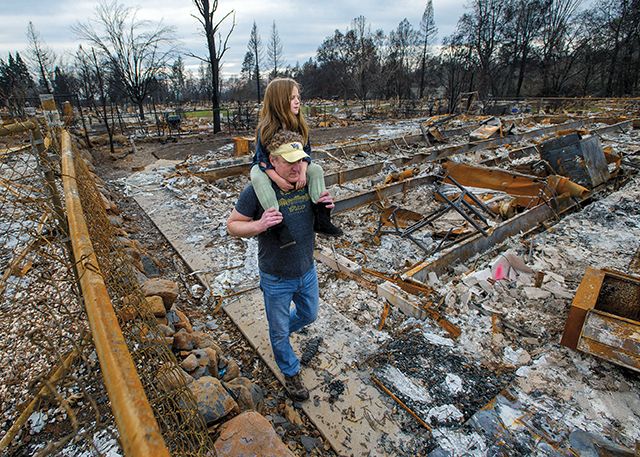
Faircloth has looked dozens of Paradise survivors in the eye and seen their pain. There are tears when he meets survivors and more tears and hugs when he offers an RV. How can he not help, he says, when he hears their stories: the teenager who raced up a mountain on a dirt bike and saved his grandma; the dad in a restaurant bathroom crying his eyes out as he prepares to tell his daughters that their mom won’t be coming home; the single mom trapped with her three children as flames surrounded her car but, just in time, rescued by a stranger. “Every single story will rip your heart out,” he says.
He has an especially soft spot in his heart for dads trying to keep their families together. He’s been divorced twice and laments, “I couldn’t keep my family together, and my house didn’t burn down.” Besides Luna, he has two sons in the U.S. Army and a daughter in high school.
Every Paradise survivor he’s met has what he calls that “trauma survivor look.” They look as if they are about to burst into tears or have been crying for days, he says. He’s seen that look before. Three years ago, he volunteered in Greece to help newly arriving Syrians fleeing the war in their home country. “It’s the same look as the Syrian refugees that had just taken a raft and barely survived the crossing of the Mediterranean and had seen the horrors of war.”
Back down the mountain in Chico, Faircloth turns into the parking lot of a Lowe’s home improvement store. He’s been to Chico half a dozen times since his first trip, so he knows his way. He drives around to the back of Lowe’s to an RV parked beside pallets of garden soil and mulch. It’s home now to Norm Bourgeois, a Vietnam War-era veteran and part-time employee at Lowe’s.
Bourgeois fled Paradise in a Toyota Corolla with his 3-year-old grandson and three other people. “You could feel the fire through the windows,” he tells me. He slept in the car and then in a tent in the Lowe’s parking lot after the fire.
Bourgeois likes to cook, so Faircloth made sure to match him with an RV equipped with a nice kitchen. It arrived right before Christmas. “That meant a lot — that I could have Christmas with the grandbaby,” Bourgeois says, as his eyes fill with tears. “It’s given me peace of mind. I can put on my hat and gloves and go into work, and then have a place to come back to and relax and be able to cook.”
Faircloth reminds Bourgeois, “You still owe me a plate of spaghetti,” and gives him a hug (pictured below).
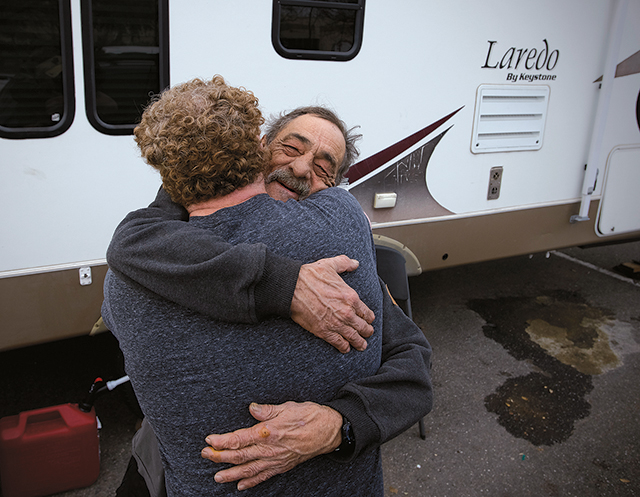
Dawn is breaking on a cool Sunday morning on “the farm,” a bucolic former walnut farm about 15 miles from Paradise. It’s now the temporary home for about 10 RVs spread out in the large backyard. RVs aren’t the only thing in short supply around Paradise; places to park RVs are almost impossible to find, too.
When the farm owner, who asked not to be identified, heard about Faircloth’s efforts, she knew he was a kindred spirit. She calls Faircloth her brother; he calls her his sister.
When Faircloth was scrambling for somewhere to put an RV for a veteran and his family, she told Faircloth to bring the RV to the farm. More RVs followed. Half the RVs here now are from Faircloth’s efforts, although the number varies as RVs come and go.
“I’ve been homeless, so this is easy for me,” the farm owner says. “These people have become my family. I will always be eternally grateful to him (Faircloth) that he put these people in my path. If I hadn’t met Woody, I wouldn’t have met these incredible people.”
A retired firefighter who tried to save his home with a garden hose lives in one RV. A single mom and two children live in another. Thomas Evans, his wife and three children — two daughters who go to Chico State and a son in high school — live in two RVs side by side. Their story is the same as those I’ve heard over and over. They lost everything except three dogs, four cats and — something I hadn’t heard before — four chickens.
Thomas Evans, a veteran of the Panama invasion and Desert Storm, was determined not to break up his family after the fire, so they stuck together, sleeping in their car and couch surfing. “I’m not much of a churchgoer, but I believe in ‘something.’ They are the ‘something,’” he says of Faircloth and the farm owners. “It brings me to tears to think about what they’ve done for everyone.” There are hugs and tears all around.
Faircloth’s waiting list has grown to 850 families hoping for an RV to bring some normalcy back to their lives while they figure out the way forward. Rebuilding an entire town isn’t going to be easy or quick. But thanks to Faircloth and the ones who heeded his call, 64 families left homeless by the fire now have a place to call home. The only thing Faircloth knows to do is continue what he started at Thanksgiving.
He happened to look at the Wake Forest admissions website recently and was struck by something he saw there. On the page explaining the University’s motto, Pro Humanitate, the headline reads: “It’s not about you.” That’s the lesson he hopes he has taught Luna on their 21-hour drives to Paradise.
“So many people have said to me, ‘You’re not even from here, why are you here?’ It’s hard to explain,” he says. “But when you read what our motto is about, then of course I’m here.”
More images from “Paradise Found”
- Most of The Plantation neighborhood in Paradise was destroyed; the clubhouse (seen here) and 12 of 101 homes somehow escaped the flames.
- A memorial to the victims of November’s massive Camp Fire in northern California,
- A melted piece of aluminum, marked with the date of the fire, is all that’s left of this family’s Jon boat; their house was destroyed.
- A survivor shows video of her family’s escape through the flames.
- Veteran Thomas Evans (center) fought to keep his family, including daughter Zada, together after the fire. His family lives in two RVs at the farm. He says of Faircloth: “There are no words to thank him.”
- Amid the ashes, life blooms again in Paradise.
- A dozen RVs donated through the efforts of Woody are scattered around property known as “the farm” in Chico, CA.
SIDEBAR:
David Wren’s Paradise Lost
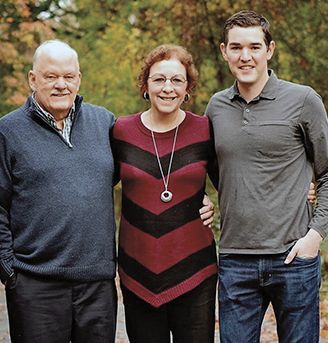 WFU Professor David Wren grew up in Paradise, CA. In December, he read on social media about Woody Faircloth (’90) and emailed to thank him and say that “his work had a lot closer roots to Wake Forest than he may have thought.”
WFU Professor David Wren grew up in Paradise, CA. In December, he read on social media about Woody Faircloth (’90) and emailed to thank him and say that “his work had a lot closer roots to Wake Forest than he may have thought.”
In the Camp Fire, Wren’s parents, Anthony and Marja Wren, lost their home of 38 years where Wren grew up. We talked to Wren about the fire and his parents’ escape.
